五个常见英语否定前缀用法辨析培训资料
英语词性表否定意义的常用前缀
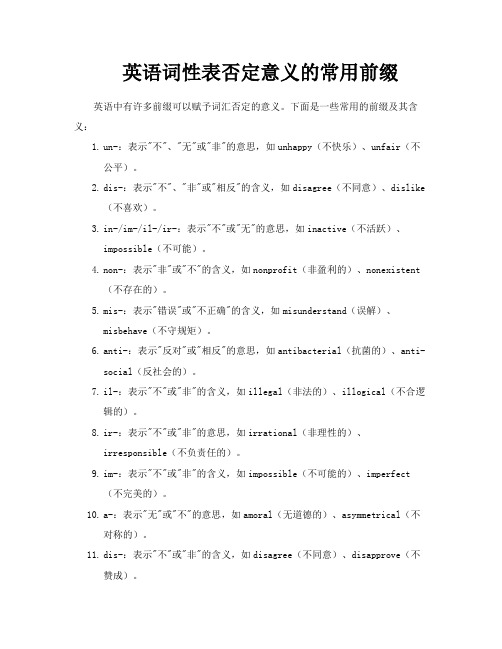
英语词性表否定意义的常用前缀英语中有许多前缀可以赋予词汇否定的意义。
下面是一些常用的前缀及其含义:1.un-:表示"不"、"无"或"非"的意思,如unhappy(不快乐)、unfair(不公平)。
2.dis-:表示"不"、"非"或"相反"的含义,如disagree(不同意)、dislike(不喜欢)。
3.in-/im-/il-/ir-:表示"不"或"无"的意思,如inactive(不活跃)、impossible(不可能)。
4.non-:表示"非"或"不"的含义,如nonprofit(非盈利的)、nonexistent(不存在的)。
5.mis-:表示"错误"或"不正确"的含义,如misunderstand(误解)、misbehave(不守规矩)。
6.anti-:表示"反对"或"相反"的意思,如antibacterial(抗菌的)、anti-social(反社会的)。
7.il-:表示"不"或"非"的含义,如illegal(非法的)、illogical(不合逻辑的)。
8.ir-:表示"不"或"非"的意思,如irrational(非理性的)、irresponsible(不负责任的)。
9.im-:表示"不"或"非"的含义,如impossible(不可能的)、imperfect(不完美的)。
10.a-:表示"无"或"不"的意思,如amoral(无道德的)、asymmetrical(不对称的)。
表否定的前缀
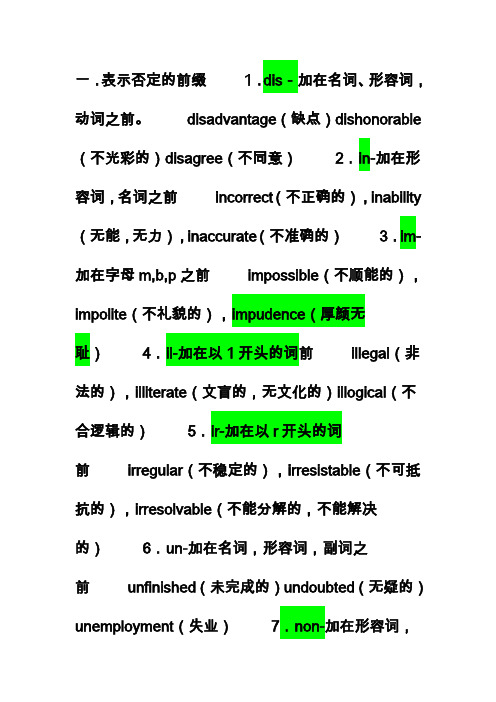
一.表示否定的前缀1.dis-加在名词、形容词,动词之前。
disadvantage(缺点)dishonorable (不光彩的)disagree(不同意)2.in-加在形容词,名词之前incorrect(不正确的),inability (无能,无力),inaccurate(不准确的)3.im-加在字母m,b,p之前impossible(不顺能的),impolite(不礼貌的),impudence(厚颜无耻)4.il-加在以1开头的词前illegal(非法的),illiterate(文盲的,无文化的)illogical(不合逻辑的)5.ir-加在以r开头的词前irregular(不稳定的),irresistable(不可抵抗的),irresolvable(不能分解的,不能解决的)6.un-加在名词,形容词,副词之前unfinished(未完成的)undoubted(无疑的)unemployment(失业)7.non-加在形容词,名词前non-existence(不存在),non-essential (不主要的),non-electrical(非电的)8.mis -加在动词、名词之前misunderstand(误解),misjudge(误判),misleading(误导),misfortune (不幸)9.dis-加地动词之前disappear (消失),disarm(解除武装),disconnect(失去联系)10.de-加在名词,形容词之前demobilize(遣散;使…复员) decolor (脱色, 漂白)11.anti-加在名词、形容词之前anti-Japanese(抗日战争),anti-social(厌恶社会的,反社会的),antidite(解毒药)12.counter-加在名词、动词前counterattack(反攻,反击),counteract(抵抗,阻碍)counterrevolution(反革命)二.表示“前before”的前缀1.pre-preconception(成见),pre-exsiting(先于……而存在的),pre-selection (选举前的)preface(前言)2.Ante-anteroom(前室,接待室),antecessor(先行者,先驱者)3.Fore-forehaed(前额),foreground (前景),foreman(工头,领班),foresee(预见,先见),foretell(预言)4.Pro-programme (计划),prologue(序幕)5.Ex-ex-president(前任总统)ex-wife (前妻)三.表示“后-post”的前缀1.post-post-war(战后),post-position (后置词),postmeridian(下午)四.表示“低”、“下”的前缀1.Hypo-Hypocrisy(伪善,虚伪),hypothesis(假设),pypocholoride(次氯酸盐)2.Infra-Infra-red(红外线),infrahuman(低于人类的),infrasonic(亚声的,次声的)3.Sub-Sub-editou(副编辑),sub-way(地铁),sub-conscious(下意识的),submarine(海下的),subtropical(亚热带的),subtitle (副标题)五.表示“回”、“再次”、“向后”的前缀1.Re-Refuel(给…加油),retranslate (再译),reinforce(加强),reconstruct(重建),return(返回)2.Retro-Retrograde(倒退的),retrospect(回顾)六.表示“共同”、“和”的前缀1.Co-co-exist(共存),co-operate (合作),co-education(男女同校)七.表示“相互”、“之间”的前缀1.Inter-Interchangeble(可互换的),interdipendert(互相依靠的),international(国际的),inter-national(交往)八. 表示“出”、“超出”的前缀1.Ec-Eclipse(蚀),ecstasy (狂想)2.Extra-Extraordinary(非凡的),extramural(校外的),extrasensory(超感觉的)九.表示“超过”的前缀1.hyper-, preter-, super-, sur-, ultra-hyper-sensitive(过敏的),preterhuman(超人的)十.其它的前缀1.auto-自automatic(自动的),auto-autobilgraphy(自传)2.mal-坏,恶Malnutrition(营养不良),maltreat(虐待)3.Micro-Microscope(显微镜),microtome(切片机)4.Tele-远Telegram (电报),telephone(电话),telescope(望远镜)5.Demi-,semi-hemi-Semi-circle(半圆),hemisphere(半球),demilune(半月,新月)6.Uni-, mono-(单一, 单独)Monotone(单调),monologue(独白),uniform(制服)7.Bi-,di-二Biyearly(二年一次的),biweekly(二周一次的),dichloride(二氯化物)8.Tri-三Triangle(三角),tripld(三角架)9.Multi-多multi-colored(颜色多样的),multi-national(多国的)10.Poly –多Polygon(多角形),polytomic(多原子的)11.Arch-首领archbishop(大主教),architect(建筑师)12.bene-善,好benefit (利益),benevolence(善意)13.homo-同homosexual(同性恋的),homograph(同形异义字)14.neo新neo-colonialism(新殖民主义),neolithic(新石器时代的)15.ortho-正确,直orthogonal(直角的),orthodox(正统)16.philo-挚爱philosopher(哲学家)17.proto-原始protohydrogen(初氢),prototype(原型),protoplasm(原生质)18.pseudo-假的, 伪的, 冒充的pseudonym(匿名),pseudo-communism (假共产主义)19.a-,ab-,abs-(只有在t,c之前)从,自avoid(避免),absent(缺少的),abstain(抑制),abstract(吸引)20.Apo-,aph-来自apology(道歉,谢罪),apostle(倡言者,先驱)21.se-分离separation(分开),secure(安全的),sedition(煽动叛乱)22.para-防parachute(降落伞),23.omni-所有的,公共的omnibus(公共汽车),omnipotence (万能)24.pan-全,泛Pan-American (全美的),pancean(万灵药),panorama(风景的全貌;万花筒)25.panto-全pantisocracy(乌托邦大同世界),pantoscopic(视野广大)26.dia-通过,借以diagonal(对角的),diagnosis(诊断),dialogue(对话)27.Per-通过,彻底,不利perambrlate(走来走去),perfect极好的28.trans-通过,横过transcript(抄本, 副本; 记录),translation (翻译),transparent(透明的),transport(运输),trans-plant(移植)29.Com-,con-,cor-,col-共同,和,完全comment(评论),compile(编辑),correlation(相互关系),collect(收集),corruption (贪污腐败),collaborate(合作,合著)30.syn-共同synonym(同义词),synchronization(同步),syntonic(谐振的),synthetic(人工的,合成的)31.meta-和,在……之后metaphor (比喻),metaphysics(形而上学)32.Cis-在这一边cisatlantic(大西洋这边的)33.pen-几乎,相近peninsular(.住在半岛上的居民,半岛(状)的, 形成半岛的)34.en-,em-往……里,使……encamp (扎营),enable(使……能),endear(使……受喜爱),embrace(拥抱,抓住(机会))35.intro内在intracardiac(心脏内部的),intramolecular (分子内部的),intracelular(细胞内部的)36.intro-到……中introduce(介绍),introspect(反省,内省)37.dys-坏dyspepsia(消化不良),dysentry(痢疾)38.Eu-优,美好eulogy(颂词),euphony(悦耳的声音)39.ambi-,amphi-两者amphibian(两栖的),ambidextrous(两只手都很灵巧的;心怀二意的;非常灵巧的)40.penta-五pentagon(五角大楼),pentagram(五角星),pentameter(五步诗句)41.sex-六sexangle(六角),sexennial (六年一度的)42.sept-七September 九月(古罗马的七月),septennial(七年一度)43.hepta-七heptab(七个成套之物),heptagon(七角形)44.octa-,octo,oct八octagon(八角形),octuple(八倍)October (十月)45.nona-,ennea-九nonagon(九角形),ennead(九个一组)46.deci-,deca-十decimal(十进位的),decagramme(十克)47.centi-百centimeter(厘米),centipede(蜈蚣)48.milli-千millenias (千年的),millimeter(毫米)49.Kilo-千kilowatt(千瓦),kilometer(千米)后缀1.-ster,-eer,-er(or)意为:从事某种职业或参与某种活动的人(person engaged in an occupation or activity)例词:gamester,gangster,songster,engineer,profiteer,mountaineer,auctioneer,driver,teacher,director,actor,professor2.-let意为:小或者不重要的东西(small,unimportant things)例词:booklet,leaflet,starlet3.-ette意为:1)小的东西(small)例词:cigarette 2)假的东西(imitation)例词:leatherette 3)女性(female)例词:usherette4.-ess意为:女性(female)例词:actress,poetess,hostess,paintress5.-hood意为:时期(status;etc.)例词:boyhood,childhood,manhood6.-ship 意为:才能,状态,资格,品质等(skill,state,condition,status,quality)例词:leadership,friendship,membership,lectureship,sportsmanship7.-ful 意为:量(the amount which noun contains)例词:cupful,handful,mouthful,spoonful8.-tion,-ion意为:1)状态,行动等(state;action;etc.)例词:action,oppression,possession,education,starva- tion 2)机构等(institution;etc.)例词:organization,foundation9.-ment意为:状态,行动等(state;action;etc.)例词:movement,enslavement,pavement10.-al意为:动作(action)例词:arrival,refusal,revival,recital,removal11.-age意为:程度,数量等(extent;amount;etc.)例词:wastage,coverage,acreage,shrinkage,breakage,hostage12.-ness;-ity (ty)意为:状态,品质(state;quality;etc.)例词:happiness,usefulness,selfishness,kindness,rapidity,activity,sanity,changeability13.-ism 意为:道义,主义,学说等(doctrine of,practice of)例词:idealism,impressionism,absenteeism,racism二、动词后缀常见的此类后缀及其具体含义如下:1.-ify意为:转为,变为(to turn into,to make or become)例词:beautify,diversify,(使多样化)simplify2.-ize;-en意为:使……,变得……(to make or become ;to make into)例词:modernize,popularize,legalize,hospitalize,symbolize,ripen,widen,heighten,threaten3.-ate意为:增加,使……(give or add,make or become)例词:originate,hydrogenate,validate,differentiate三、形容词后缀:常见的此类后缀及其具体含义如下:1.-ful意为:充满,有(full of;hav- ing;giving;etc.)例词:useful,pitiful,hopeful,helpful,forgetful,thankful,fearful2.-less意为:没有,无(without;not giving)例词:speechless,childless,harmless,hopeless,meaningless3.-ly意为:有……品质的(having the qualities of)例词:beastly,manly,brotherly,friendly4.-like意为:像……的(like)例词:childlike,statesmanlike,tiger-like5.-y;-ish意为:像……一般的(somewhat like)例词:meaty,sandy,silky,hairy,leafy,watery,foolish,girlish,blackish,thinnish6.-some意为:像……一样的;引起……的;有……品质的(like;causing;having the quality of)例词:troublesome,burdensome,wholesome,tiresome,bothersome7.-able(ible)意为:能……的;可以……的(able to be ;capable)例词:changeable,readable,drinkable,comfortable,expansible,convincible8.-ed意为:有……的(having,etc.)例词:wooded,pointed,moneyed,odd-shaped9.-al意为:有……属性的,……类型的(nature of,typical of)例词:cultural,personal,regional,musical10.-ary(ory)意为:属于……的,与……相连的(belonging to;connected with)例词:revolutionary,imaginary,contradictory11.-ous意为:富含……的;有……品质的;像……的(full of;having the quality of;like)例词:glorious,erroneous,malicious,gracious12.-ic(ical)意为:……类的;属于……的(typical of;belonging to)例词:historic,historical,methodic,methodical,dramatic,heroic13.-ive 意为:有……属性的;有某种倾向的(having thenature or quality of;given or tending to)例词:attractive,talkative,restrictive,defensive,preventive,constructive,sensitive四、副词后缀常见的此类后缀及其具体含义如下:1.-ly意为:以……方式(in a...manner;etc.)例词:happily,boldly,attentive- ly,strangely2.-ward(s)意为:表示方式或动作的方向(manner and direction of movement)例词:onward(s),backward(s),earthward(s),homeward(s),eastward(s)3.-wise意为:1)按照……方式(in the manner of)例词:crabwise,clockwise2)就……而言(as far as ...is concerned)例词:weatherwise ,educationwise有一个原因的单音节词,结尾只有一个单音辅音,在加以元音后缀是,要双写这个辅音.例词:run + er = runner hit + ing = hitting。
英语表示否定的前缀

英语中表示否定的前缀1. 前缀ab表示否定use v.使用——abuse v.滥用normal adj.正常——abnormal adj.不正常的present adj.——absent adj.缺席abandon v.放弃(abandon oneself to do sth放弃做某事)abolish v.废除2. 前缀mis表示否定misunderstand v.误解、误会mistake n.误会(make a mistake 犯错误)mislead v.误导misjudge v.误判misfortune n.不幸3. 前缀in表示否定,变体有im/ir/ilA. in用于1大多数此跟前indirect adj.间接的incorrect adj.不正确indifferent adj.漠不关心的infinite adj.无限的B. Im用于b/m/p开头的词根前impossible adj.不可能的imbalanced adj.不平衡的impatient adj.不耐心的immobile adj.固定的C. Ir用于r开头的词根前irresponsible adj.不负责任irregular adj.不规则的D. il用于l开头的词根前illegal adj.不合法的illogical adj.不合逻辑的illiterate adj.不识字的(illiteracy rate 文盲率)4. 前缀dis表示否定disagree v.不同意(disagreement n.不同意)discovery n.出现disappear v.消失(disappearance n.消失)discount n.折扣disorder n.混乱disease n.疾病disadvantage n.缺点5. 前缀de表示否定decrease v.减少——increase v.增加devaluate v.贬值deline v.衰退deforest 砍伐degenerate v.退化。
un否定前缀知识点总结
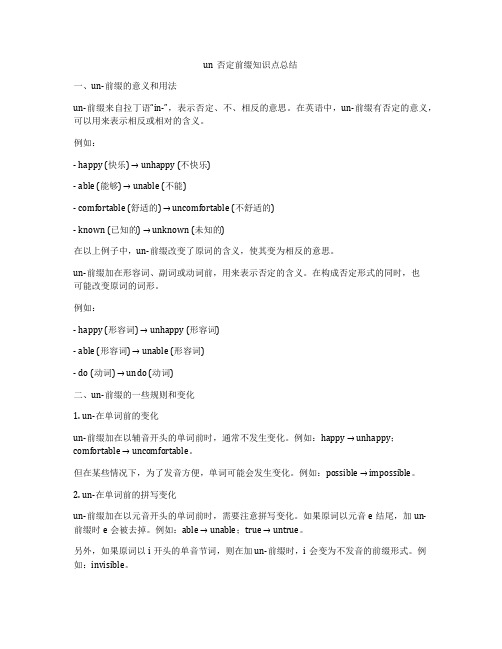
un否定前缀知识点总结一、un-前缀的意义和用法un-前缀来自拉丁语“in-”,表示否定、不、相反的意思。
在英语中,un-前缀有否定的意义,可以用来表示相反或相对的含义。
例如:- happy (快乐) → unhappy (不快乐)- able (能够) → unable (不能)- comfortable (舒适的) → uncomfortable (不舒适的)- known (已知的) → unknown (未知的)在以上例子中,un-前缀改变了原词的含义,使其变为相反的意思。
un-前缀加在形容词、副词或动词前,用来表示否定的含义。
在构成否定形式的同时,也可能改变原词的词形。
例如:- happy (形容词) → unhappy (形容词)- able (形容词) → unable (形容词)- do (动词) → undo (动词)二、un-前缀的一些规则和变化1. un-在单词前的变化un-前缀加在以辅音开头的单词前时,通常不发生变化。
例如:happy → unhappy;comfortable → uncomfortable。
但在某些情况下,为了发音方便,单词可能会发生变化。
例如:possible → impossible。
2. un-在单词前的拼写变化un-前缀加在以元音开头的单词前时,需要注意拼写变化。
如果原词以元音e结尾,加un-前缀时e会被去掉。
例如:able → unable;true → untrue。
另外,如果原词以i开头的单音节词,则在加un-前缀时,i会变为不发音的前缀形式。
例如:invisible。
3. un-前缀的否定效果un-前缀加在词根前时,使词的含义转为否定。
但有时仅靠un-前缀并不能完全表达否定的意思,需要结合上下文来理解。
例如:- interesting (有趣的) → uninteresting (无趣的)- fortunate (幸运的) → unfortunate (不幸的)4. un-前缀的一些变形在一些词中,un-前缀的否定含义也可能会转化为其他形式,例如:dis-、in-、non-等。
否定前缀用法总结

否定前缀用法总结
否定前缀用法总结
一、常见的否定前缀
(1)un-:表示“不,非”,如:unable不能,unhappy不快乐,unacceptable不能接受,unbalanced不平衡。
(2)in-:表示“无,不”,如:inexpensive不贵的,incomplete 不完成的,inaccurate不准确的,incorrect不正确的。
(3)non-:表示“无,非”,如:nonstop不停的,nonfiction非虚构作品,nondescript不吸引人的,nonpayment不付款。
(4)dis-:表示“分开,逆,不”,如:dishonest不诚实的,disappear 消失,disagree不同意,disorder杂乱,。
二、否定前缀在不同词性中的使用
(1)形容词:如unhappy, inexpensive, incorrect, dishonest, nondescript等。
(2)动词:如unite(不结合),inhibit(不抑制),dislodge(不移动),nonplus(使不知所措)等。
(3)副词:如unwillingly(不情愿),inevitably(不可避免),disgracefully(不光彩)等。
(4)名词:如unbeliever(不信的人),injustice(不公正),nonentity(无足轻重的人),disorder(无秩序)等。
(完整版)英文否定前缀总结
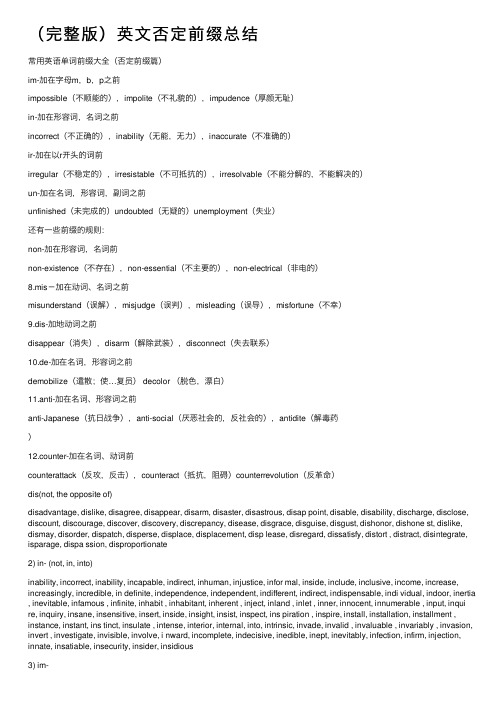
(完整版)英⽂否定前缀总结常⽤英语单词前缀⼤全(否定前缀篇)im-加在字母m,b,p之前impossible(不顺能的),impolite(不礼貌的),impudence(厚颜⽆耻)in-加在形容词,名词之前incorrect(不正确的),inability(⽆能,⽆⼒),inaccurate(不准确的)ir-加在以r开头的词前irregular(不稳定的),irresistable(不可抵抗的),irresolvable(不能分解的,不能解决的)un-加在名词,形容词,副词之前unfinished(未完成的)undoubted(⽆疑的)unemployment(失业)还有⼀些前缀的规则:non-加在形容词,名词前non-existence(不存在),non-essential(不主要的),non-electrical(⾮电的)8.mis-加在动词、名词之前misunderstand(误解),misjudge(误判),misleading(误导),misfortune(不幸)9.dis-加地动词之前disappear(消失),disarm(解除武装),disconnect(失去联系)10.de-加在名词,形容词之前demobilize(遣散;使…复员) decolor (脱⾊,漂⽩)11.anti-加在名词、形容词之前anti-Japanese(抗⽇战争),anti-social(厌恶社会的,反社会的),antidite(解毒药)12.counter-加在名词、动词前counterattack(反攻,反击),counteract(抵抗,阻碍)counterrevolution(反⾰命)dis(not, the opposite of)disadvantage, dislike, disagree, disappear, disarm, disaster, disastrous, disap point, disable, disability, discharge, disclose, discount, discourage, discover, discovery, discrepancy, disease, disgrace, disguise, disgust, dishonor, dishone st, dislike, dismay, disorder, dispatch, disperse, displace, displacement, disp lease, disregard, dissatisfy, distort , distract, disintegrate, isparage, dispa ssion, disproportionate2) in- (not, in, into)inability, incorrect, inability, incapable, indirect, inhuman, injustice, infor mal, inside, include, inclusive, income, increase, increasingly, incredible, in definite, independence, independent, indifferent, indirect, indispensable, indi vidual, indoor, inertia , inevitable, infamous , infinite, inhabit , inhabitant, inherent , inject, inland , inlet , inner, innocent, innumerable , input, inqui re, inquiry, insane, insensitive, insert, inside, insight, insist, inspect, ins piration , inspire, install, installation, installment , instance, instant, ins tinct, insulate , intense, interior, internal, into, intrinsic, invade, invalid , invaluable , invariably , invasion, invert , investigate, invisible, involve, i nward, incomplete, indecisive, inedible, inept, inevitably, infection, infirm, injection, innate, insatiable, insecurity, insider, insidious3) im-(not, in, into) impossible, imbalance, immature, immoral, impatient, implicit , impress, impression, import, immigrate, imprison, immerse4) il- (not)illegal, illiterate, illogical ir- (not) irregular, irresponsible, irrespective 5) un- (not)unable, uncover, undo, undoubtedly, undress , uneasy, unemployment , unexpected, unfold , unfortunately, unimportant, unlike, unload, unusual, unaware, enlightened, unparalleled, unsustainable,6) non- (not)nonsmoker, nonexistence, non-cooperation, nonstop, nonmetal, nonresident, nonse nse, nonfundamentalist, nonspecialist 7) mis- (wrong, wrongly)mislead, misspell, misstep, misfortune, misuse, misguided, misinformation8) de- (showing the opposite, to remove, to reduce)deform, deface, demobilize, destruction, deforest, denationalize, depress, depr ession, decode, decrease, degenerate , degrade , descend, descendant , descent。
否定意义前缀
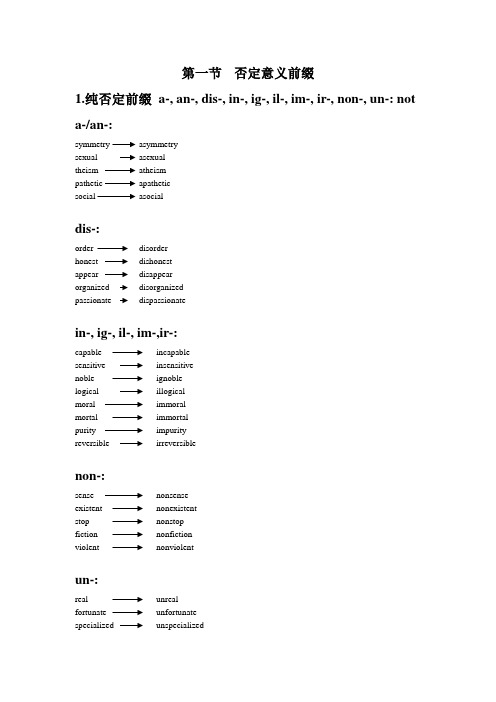
第一节否定意义前缀1.纯否定前缀a-, an-, dis-, in-, ig-, il-, im-, ir-, non-, un-: not a-/an-:symmetry asymmetrysexual asexualtheism atheismpathetic apatheticsocial asocialdis-:order disorderhonest dishonestappear disappearorganized disorganizedpassionate dispassionatein-, ig-, il-, im-,ir-:capable incapablesensitive insensitivenoble ignoblelogical illogicalmoral immoralmortal immortalpurity impurityreversible irreversiblenon-:sense nonsenseexistent nonexistentstop nonstopfiction nonfictionviolent nonviolentun-:real unrealfortunate unfortunatespecialized unspecializedcivilized uncivilizededucated uneducated??? in-/un-Unapt=inaptUnreligious=irreligiousUnexpressive=inexpressiveInexpressibleUnpractical=impracticalImpracticable通常不用在贬义词前Kind unkindWorthy unworthyFoolish cleverUgly beautifulBad good开头的字用un-否定unimportant uninhabitable-ate, -ent, -ant, -ite, -ible的单词,多用in-否定Inadequate irrelevant independent indefinite indefensible-able, -ed, -ful, -ing, -ory, -some的单词,多用un-否定Unable undecided unsuccessful unceasing unsatisfactorySpecial examples:Unlike dislikeUnmoral immoral amoralUncomfortable discomfort2. 倒转意义前缀reversing prefix: de-, dis-, un-De-: to remove, to reverse the effect of an actionFrost defrostCeler (stem) decelerateCentralize decentralizeFend defendCompose decomposeCode decodeDis-: to reverse, to removeCourage discourageConnect disconnectArm disarmOrganize disorganizeProof disproofUn-: to reverse some action or stateHook unhookFold unfoldFasten unfastenLock unlockLoad unloadWrap unwrapsay unsay3. 反对前缀anti-, contra-, counter-, ob-:against, opposite toAnti-/ant-:Pathos antipathythesis antithesiswar antiwararctic Antarcticbody antibodybiotic antibioticabortion antiabortioncontro-, contra-, contre-diction contradictionposition contrapositionvene(stem come) contravenevert(stem turn) controvertcounter-:act counteractbalance counterbalancepart counterpartproductive counterproductiveclockwise counterclockwiseob-, oc-, of-, op-:ject(stem) objectfend offendpress oppresspose opposeSpecial examples:a-: not atonalplace where ashorea state asleep awake alivedis: not disapprove disobeyreverse/remove disengagein-: not inaccuratein income inland insideun-: not unfaira reversal of some action bend---unbend第二节空间方位前缀1.前ante-, fore-, pre-, pro-Ante-: beforeRoom---anteroomDate---antedateCede(stem go)---antecedentBell---antebellumFore-: beforeTell---foretellHead---foreheadFather---forefatherSee---foreseeWord---forewordRunner---forerunnerBode---forebodeArm---forearmPre-: beforeSchool---preschoolHistoric---prehistoricFix---prefixheat---preheatcaution---precautioncede(stem go)---precededict---predictdestination---predestinationpro-: forwardgress---progressject---projectlong---prolongmin---prominentmote---promotepel---propelspect---prospecttrude---protrude2.后post-, re-, retro-: after, backward, returnPost-: afterWar---postwarGraduate---postgraduateScript---postscriptDoctoral---postdoctoralDate---postdateRe-: backwardGress---regressCede---recedeTract---retractTurn---returnCall---recallClaim---reclaimBound---reboundRetro-: backwardCede---retrocedeSpect---retrospectAction---retroactionFlex---retroflex3.上over-, super-, sur-, hyper-, epi-: above, excessive, toomuchOver:look---overlookcast---overcastcoat---overcoatcome---overcomework---overworkdose---overdosecorrect---overcorrectestimate---overestimateweight---overweightsleep---oversleepsuper-: above, beyondsuperman supermarket superstar superpower supernatural superscript supersonic superstructure supervisesur-: over, abovemount---surmountface---surfacename---surnamepass---surpassplus---surplusreal---surrealvive---survivehyper-: excessive, too muchhypercriticalhypersensitivehypertensionhyperboleepi-: aboveepidermalepigramepithet4.下under-, sub-, de-, hypo-, infra-: under, below, down,lowSub-:underSubwaySubmarineSubconsciousSubstandardSubnormalSubscribeDe-: downDepressDevalueDegenerateDegradeDefameUnder-: below, less thanUndergroundUnderlineUnderestimateUndercurrentUnderdevelopedUndergraduateHypo-: under, beneathHypotensionHypocrisyHypothesisHypothermiaInfra-: BelowInfrastructureInfraredinfrasound5.内in-, im-, intro-, ,intra, en-, em-: in, insideIn-: in enterIndoor inland inject incisive incorporate invade includeIm-: in, inward, enterImmigrate import imperil impoverish impress imprisonIntra-: insideMural---intramuralMuscular---intramuscularState---intrastateEn-: inEncage enclose engulf enroll embalm embed empathy6.外e-, ex-, extra-, ultra-, out-: out, out of, awaye-: outvalue---evaluateject---ejectmigrate---emigratemerge---emergevade---evadeex-: outclude---excludeport---exporttract---extractpel---expelpose---exposecise---excisepatr---expatriateextra-: outside of, beyondcurriculum---extracurricularmarital---extramaritalordinary---extraordinaryterrestrial [tiˈrestriəl] ---extraterrestrialultra-:beyondultraviolet ultrasoundout-: surpassing, outoutgrow outlast outlaw outline output7.中间inter-, mid: between, in the middle ofInter-: between, from one to anotherInternational intercontinental intercity interpersonal internet interplay interlock interjectMid-: in the middle ofMidday midfield midnight midstream midsummer midway midwife8.周围circum-:around, roundCircumnavigate circumspect circumstance circumvent circumscribe。
英文中常用否定前缀总结

英文中常用否定前缀总结英文中常用否定前缀总结anti-表示,相反的,相对的 antibody 抗体non-表示“非”nonhuman 非人类英语中大部分否定前缀构词法:1> dis加在形容词前-- agreeable(adj.使人愉快的)à disagreeable(adj.不愉快的)-- content(adj.满意的 vt.使满足)à discontent(adj.不满的 vt.令人不满 n.不满)-- graceful(adj.优美的)à disgraceful(adj.使失体面的, 耻辱的)-- honest(adj.诚实的, 正直的)à dishonest(adj.不诚实的)-- satisfactory(adj.满意的)à dissatisfactory(adj.不满意的)加在名词前-- agreement(n.同意)à disagreement(n.意见不同)-- honesty(n.诚实, 正直)à disho nesty(n.不诚实, 不老实)-- ability(n.能力, 才干)à disability(n.无力, 无能)-- grace (n.优美, 雅致)à disgrace(n.耻辱)-- comfort(n.舒适 vt.安慰)à discomfort(n.不舒适 vt.使不舒适)可以加在动词前-- agree(v.同意)à disagree(v.不同意)-- appear(vi.出现)à disappear(vi.消失, 不见)-- believe(相信, 信任)à disbelieve(v.不信, 怀疑)在名词前加dis得到动词, 表示除去、解除。
-- courage(n.勇气, 精神)à discourage(vt.使气馁)-- root(n.根, 根部)à disroot / unroot(vt.连根拔除)-- mask(n.面具, 掩饰 v.戴面具, 掩饰)à unmask / dismask(vt.揭露, 暴露)-- burden(n.担子, 负担 v.负担)à disburden(v.解除负担)2>il -- 加在以i开头的形容词之前-- legal(adj.法律的, 法定的)à illegal(adj.违法的)-- logical (adj.合乎逻辑的)à illogical(adj.不合逻辑的)-- literate(adj.有文化的 n.学者)à illiterate(adj.没受教育的 n.文盲)3>im -- 加在以b, m, p开头的形容词之前-- possible(adj.可能的)à impossible(adj.不可能的)-- mortal(adj.必死的, 人类的)à immortal(adj.不朽的)-- moral (adj.道德的)à imm oral(adj.不道德的)-- balanced(adj.平衡的)à imbalanced(adj.不平衡的)-- balance (n.平衡)à imbalance(n.不平衡)4>ir -- 加在以r开头的形容词之前-- regular(adj.规则的)à irregular(adj.不规则的)-- rational(adj.理性的)à irrational(adj.无理性的)-- resistible(adj.可抵抗的)à irresistlble(adj.不可抵抗的)5>in --主要用于其它字母开头的词之前-- human(adj.人性的)à inhuman(adj.野蛮的)-- correct(adj.正确的)à incorrect(adj.不正确的)-- justice(n.正义, 公平)à injustice(n.不正义, 不公平)-- sincere(adj.真诚的)à insincere(adj.虚假的, 不真诚的)6>un --只能用于形容词和动词之前不-- happy(adj.快乐的)à unhappy(adj.不幸的, 不快乐的)-- friendly(adj.友好的)à unfriendly(adj.不友好的)-- lucky(adj.幸运的)à unlucky(adj.不幸的)无-- conditional(adj.有条件的)à unconditional(adj.无条件的)-- limited(adj.有限的)à unlimited(adj.无限的)非-- official(adj.官方的, 正式的)à unofficial(adj.非官方的, 非正式的)-- just(adj.正义的, 公正的)à unjust(adj.不公平的)未(主要用于过去分词之前)-- undecided(adj.未定的)à unfinished(adj.未完成的)-- unexpected(adj.未预料到)à unhurt(adj.没有受伤的)用于动词之前表示做相反的动作-- lock(v.锁, 锁上)à unlock(vt.开...锁)-- tie(vt.系, 打结)à untie(vi.松开, 解开)-- cover(vt.覆盖)à uncover(vt.揭开, 揭露)-- pack(vt.包装)à unpack(v.打开包裹)-- dress(v.穿衣)à undress(vt.使脱衣服)-- load(v.装载)à unload(v.卸货)Exercise:1> polite(adj.有礼貌的)à impolite(adj.无礼的, 粗鲁的)2> agree à disagree3> legible(adj.清晰的, 易读的)à illegible(adj.难辨认的, 字迹模糊的)4> accurate(adj.正确的, 精确的)à inaccurate(adj.错误的, 不准确的)5> locked à unl ocked6> regular à irregular否定前缀填空1. You will be_____________ (able) to pass the exam if you don’t study hard.2. There are lots of ________ (common) kinds of birds in Zhalong. Many people like to go birdwatching there.3. It is ___________ (necessary) for you to walk the little dog once a week to the park.4. It is ___________ (important) to keep quiet when you watch the birds and insects.5. He feels _________(happy) because helost his wallet.6. There is a ________ (regular) rain in Sahara desert every year.7. Is it __________(possible) to get to the city by train?8. Some people are ___________ ( friendly) to birds. They throw stones to them.9. Some people feel ____ (happy) that government give poor people such small and ____(comfortable) flats.10. It is _______ (safe) to walk on the street at night.11. We should keep students staying away from the ________ (healthy) books.12. These trainers are too small. They are ______________(comfortable) to wear.13. If someone does not show good manners to others, he is ____________(polite).14. Jim never tells lies and he is an ___________ (honest) boy.15. This girl is so __________(care) that she often makes mistakes in her homework.◇江苏13城市中考试题汇编◇1. It's ________(friendly) of him to say such bad words to his classmates. (08常州)2. Don't get _________(patient) about your personal trouble. (08无锡)3. He seemed ______(friend) at first, but now I've got to know him and I realize he's warm and kind. (08徐州)4. If someone doesn't show good manners to others, he or she is __________(polite). (08宿迁)5. It’s so ___________(不公平的)! Mary gets more money forless work. (09镇江)6. The basketball team was __________(luck) to lose in the final minute of the game. (09徐州)7. In some ways, the space shuttles travel fast, but the journey to Mars may be very___(comfortable). (09泰州)8. it’s ___________(possible) for us to finish so much work within so little time. We needhelp. (2010南通)9. Simon is such a __________(honest) person that no one believes him. (2010扬州)10. D on’t be ________(patient)! You should listen to what he is saying first. (2010常州)11. It is _________(possible) for me to design the poster without your help. (2010泰州)12. it’s not easy for those superstars to face ___________(无穷无尽的)interviews and doubts. (2010镇江)。
英语常见前缀的意思和用法
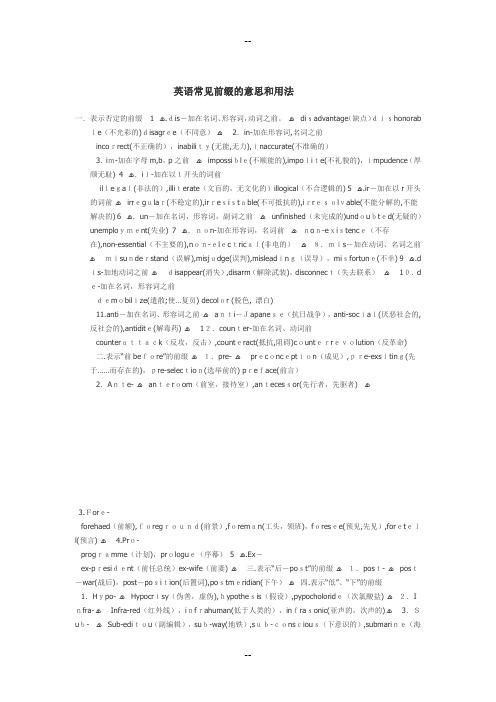
英语常见前缀的意思和用法1.dis-加在名词、形容词,动词之前。
ﻫdisadvantage(缺点)dishonorab 一.表示否定的前缀ﻫle(不光彩的)disagree(不同意)ﻫ2.in-加在形容词,名词之前incorrect(不正确的),inability(无能,无力),inaccurate(不准确的)3.im-加在字母m,b,p之前ﻫimpossible(不顺能的),impolite(不礼貌的),impudence(厚4.il-加在以1开头的词前颜无耻) ﻫ5.ir-加在以r开头illegal(非法的),illiterate(文盲的,无文化的)illogical(不合逻辑的) ﻫ的词前ﻫirregular(不稳定的),irresistable(不可抵抗的),irresolvable(不能分解的,不能6.un-加在名词,形容词,副词之前ﻫunfinished(未完成的)undoubted(无疑的)解决的) ﻫ7.non-加在形容词,名词前ﻫnon-existence(不存unemployment(失业) ﻫ在),non-essential(不主要的),non-electrical(非电的)ﻫ8.mis-加在动词、名词之前9.dﻫmisunderstand(误解),misjudge(误判),misleading(误导),misfortune(不幸) ﻫis-加地动词之前ﻫdisappear(消失),disarm(解除武装),disconnect(失去联系)ﻫ10.d e-加在名词,形容词之前demobilize(遣散;使…复员) decolor (脱色, 漂白)11.anti-加在名词、形容词之前ﻫanti-Japanese(抗日战争),anti-social(厌恶社会的,反社会的),antidite(解毒药) ﻫ12.counter-加在名词、动词前counterattack(反攻,反击),counteract(抵抗,阻碍)counterrevolution(反革命)二.表示“前before”的前缀ﻫ1.pre- ﻫpreconception(成见),pre-exsiting(先于……而存在的),pre-selection(选举前的) preface(前言)2.Ante- ﻫanteroom(前室,接待室),antecessor(先行者,先驱者)ﻫ3.Fore-forehaed(前额),foreground(前景),foreman(工头,领班),foresee(预见,先见),foretell(预言) ﻫ 4.Pro-5.Ex-programme(计划),prologue(序幕)ﻫex-president(前任总统)ex-wife(前妻) ﻫ三.表示“后-post”的前缀ﻫ1.post- ﻫpost-war(战后),post-position(后置词),postmeridian(下午)ﻫ四.表示“低”、“下”的前缀1.Hypo- ﻫHypocrisy(伪善,虚伪),hypothesis(假设),pypocholoride(次氯酸盐) ﻫ2.I nfra- ﻫInfra-red(红外线),infrahuman(低于人类的),infrasonic(亚声的,次声的) ﻫ3.Sub-ﻫSub-editou(副编辑),sub-way(地铁),sub-conscious(下意识的),submarine(海下的),subtropical(亚热带的),subtitle(副标题)五.表示“回”、“再次”、“向后”的前缀1.Re-ﻫRefuel(给…加油),retranslate(再译),reinforce(加强),reconstruct(重建),return(返回)ﻫ2.Retro-Retrograde(倒退的),retrospect(回顾)1.Co- ﻫco-exist(共存),co-operate(合作),co-educati六.表示“共同”、“和”的前缀ﻫon(男女同校) ﻫ七.表示“相互”、“之间”的前缀1.Inter-Interchangeble(可互换的),interdipendert(互相依靠的),international(国际的),inter-national(交往)1.Ec-八.表示“出”、“超出”的前缀ﻫEclipse(蚀),ecstasy(狂想)ﻫ2.Extra-ﻫExtraordinary(非凡的),extramural(校外的),extrasensory(超感觉的)1.hyper-, preter-, super-, sur-,ultra-九.表示“超过”的前缀ﻫhyper-sensitive(过敏的),preterhuman(超人的)十.其它的前缀ﻫ1.auto-自2.mal-坏,恶automatic(自动的),auto-autobilgraphy(自传)ﻫMalnutrition(营养不良),maltreat(虐待)3.Micro-ﻫMicroscope(显微镜),microtome(切片机)ﻫ4.Tele-远Telegram(电报),telephone(电话),telescope(望远镜)5.Demi-,semi-hemi-6.Uni-, mono-(单一, 单Semi-circle(半圆),hemisphere(半球),demilune(半月,新月)ﻫ独)ﻫMonotone(单调),monologue(独白),uniform(制服)7.Bi-,di-二ﻫBiyearly(二年一次的),biweekly(二周一次的),dichloride(二氯化物)ﻫ8.Tr i-三ﻫTriangle(三角),tripld(三角架)10.Poly –多9.Multi-多ﻫmulti-colored(颜色多样的),multi-national(多国的)ﻫPolygon(多角形),polytomic(多原子的)ﻫ11.Arch-首领archbishop(大主教),architect(建筑师)12.bene-善,好benefit(利益),benevolence(善意)ﻫ13.homo-同ﻫhomosexual(同性恋的),homogr aph(同形异义字)ﻫ14.neo新ﻫneo-colonialism(新殖民主义),neolithic(新石器时代的)ﻫ15.ortho-正确,直orthogonal(直角的),orthodox(正统) ﻫ16.philo-挚爱17.proto-原始philosopher(哲学家) ﻫprotohydrogen(初氢),prototype(原型),protoplasm(原生质)ﻫ18.pseudo-假的, 伪的, 冒充的pseudonym(匿名),pseudo-communism(假共产主义)19.a-,ab-,abs-(只有在t,c之前)从,自ﻫavoid(避免),absent(缺少的),abstain(抑制),abstract(吸引)20.Apo-,aph-来自apology(道歉,谢罪),apostle(倡言者,先驱)ﻫ21.se-分离ﻫseparation(分开),secure (安全的),sedition(煽动叛乱)22.para-防ﻫparachute(降落伞),23.omni-所有的,公共的omnibus(公共汽车),omnipotence(万能)ﻫ24.pan-全,泛25.panto-Pan-American(全美的),pancean(万灵药),panorama(风景的全貌;万花筒) ﻫ全pantisocracy(乌托邦大同世界),pantoscopic(视野广大)26.dia-通过,借以diagonal(对角的),diagnosis(诊断),dialogue(对话)27.Per-通过,彻底,不利perambrlate(走来走去),perfect极好的28.trans-通过,横过transcript(抄本, 副本; 记录),translation(翻译),trxnsparent(透明的),transport(运输),trans-plant(移植)29.Com-,con-,cor-,col-共同,和,完全comment(评论),compile(编辑),correlation(相互关系),collect(收集),corruption(贪污腐败),collaborate(合作,合著)30.syn-共同synonym(同义词),synchronization(同步),syntonic(谐振的),synthetic(人工的,合成的)ﻫ31.meta-和,在……之后ﻫmetaphor(比喻),metaphysics(形而上学)ﻫ32.C is-在这一边cisatlantic(大西洋这边的)33.pen-几乎,相近peninsular(.住在半岛上的居民,半岛(状)的, 形成半岛的) ﻫ34.en-,em-往……里,使……ﻫencamp(扎营),enable(使……能),endear(使……受喜爱),embrace(拥抱,抓住(机会))35.intro内在intracardiac(心脏内部的),intramolecular(分子内部的),intracelular(细胞内部的)37.dys-坏ﻫdyspep ﻫ36.intro-到……中ﻫintroduce(介绍),introspect(反省,内省)ﻫsia(消化不良),dysentry(痢疾)38.Eu-优,美好ﻫeulogy(颂词),euphony(悦耳的声音) ﻫ39.ambi-,amphi-两者40.penta-amphibian(两栖的),ambidextrous(两只手都很灵巧的;心怀二意的;非常灵巧的)ﻫ五pentagon(五角大楼),pentagram(五角星),pentameter(五步诗句)41.sex-六sexangle(六角),sexennial(六年一度的)42. sept-七ﻫSeptember九月(古罗马的七月),septennial(七年一度)44.octa-,octo,oct八43.hepta-七ﻫheptab(七个成套之物),heptagon(七角形) ﻫﻫoctagon(八角形),octuple(八倍)October (十月)ﻫ45.nona-,ennea-九46.deci-,deca-十ﻫdecimal(十进位的),decnonagon(九角形),ennead(九个一组) ﻫagramme(十克)47.centi-百ﻫcentimeter(厘米),centipede(蜈蚣)48.milli-千ﻫmillenias(千年的),millimeter(毫米)ﻫ49.Kilo-千kilowatt(千瓦),kilometer(千米)ﻫ。
五个常见英语否定前缀用法辨析
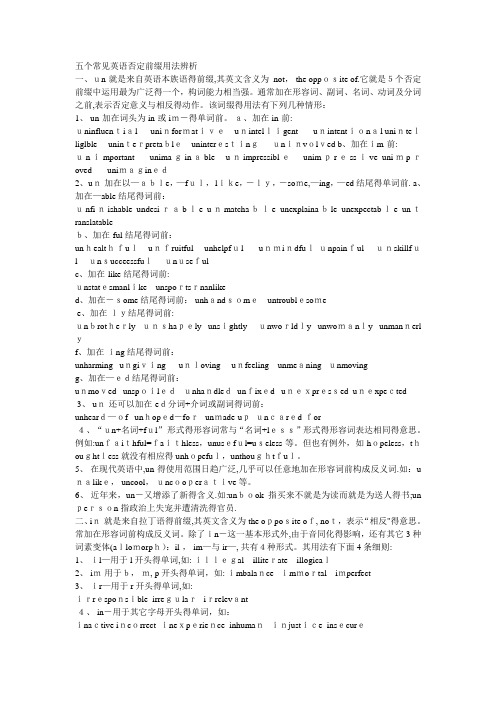
五个常见英语否定前缀用法辨析一、un-就是来自英语本族语得前缀,其英文含义为not, the opposite of.它就是5个否定前缀中运用最为广泛得一个,构词能力相当强。
通常加在形容词、副词、名词、动词及分词之前,表示否定意义与相反得动作。
该词缀得用法有下列几种情形:1、 un-加在词头为in-或im-得单词前。
a、加在in-前:uninfluential uninformative unintelligent unintentional unintelliglble uninterpretable uninterestinguninvolved b、加在im-前:unimportant unimaginable unimpressible unimpressive unimproved unimagined2、 un-加在以—able,—ful,-like,-ly,-some,—ing,—ed结尾得单词前. a、加在—able结尾得词前:unfinishable undesirable unmatchable unexplainable unexpectable untranslatableb、加在-ful结尾得词前:unhealthful unfruitful unhelpful unmindfulunpainful unskillful unsucceessfulunusefulc、加在-like结尾得词前:unstatesmanlike unsportsrnanliked、加在-some结尾得词前: unhandsome untroublesomee、加在-ly结尾得词前:unbrotherly unshapely unsightly unworldly unwomanly unmannerl yf、加在-ing结尾得词前:unharming ungiving unloving unfeeling unmeaning unmovingg、加在—ed结尾得词前:unmoved unspoiledunhandled unfixed unexpressed unexpected3、 un-还可以加在-ed分词+介词或副词得词前:unheard—of unhoped-for unmade-upuncared-for4、“un+名词+ful”形式得形容词常与“名词+less”形式得形容词表达相同得意思。
(完整版)常见英语否定前缀整理
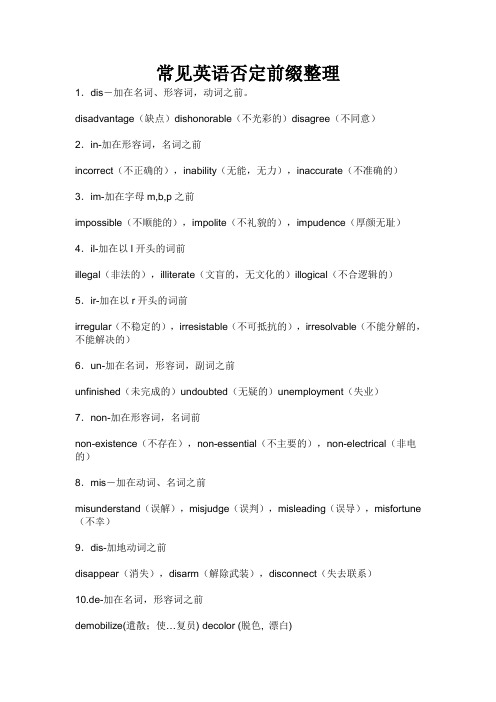
常见英语否定前缀整理1.dis-加在名词、形容词,动词之前。
disadvantage(缺点)dishonorable(不光彩的)disagree(不同意)2.in-加在形容词,名词之前incorrect(不正确的),inability(无能,无力),inaccurate(不准确的)3.im-加在字母m,b,p之前impossible(不顺能的),impolite(不礼貌的),impudence(厚颜无耻)4.il-加在以l开头的词前illegal(非法的),illiterate(文盲的,无文化的)illogical(不合逻辑的)5.ir-加在以r开头的词前irregular(不稳定的),irresistable(不可抵抗的),irresolvable(不能分解的,不能解决的)6.un-加在名词,形容词,副词之前unfinished(未完成的)undoubted(无疑的)unemployment(失业)7.non-加在形容词,名词前non-existence(不存在),non-essential(不主要的),non-electrical(非电的)8.mis-加在动词、名词之前misunderstand(误解),misjudge(误判),misleading(误导),misfortune (不幸)9.dis-加地动词之前disappear(消失),disarm(解除武装),disconnect(失去联系)10.de-加在名词,形容词之前demobilize(遣散;使…复员) decolor (脱色, 漂白)11.anti-加在名词、形容词之前anti-Japanese(抗日战争),anti-social(厌恶社会的,反社会的),antidite (解毒药)12.counter-加在名词、动词前counterattack(反攻,反击),counteract(抵抗,阻碍)counterrevolution(反革命)。
(完整版)常见英语否定前缀整理.doc
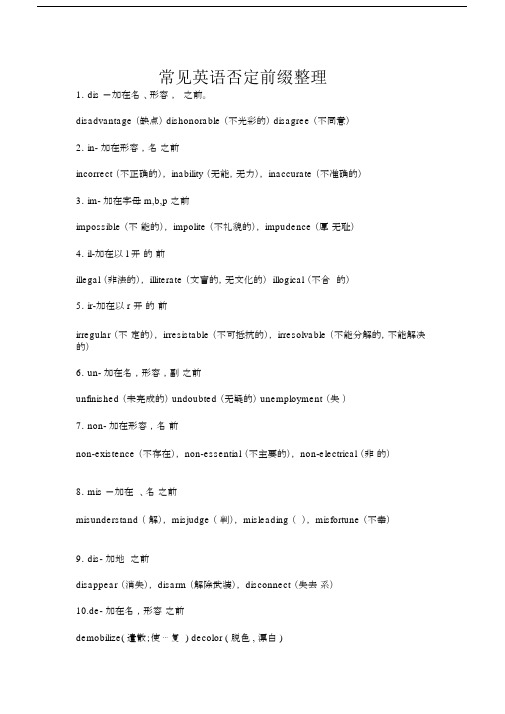
常见英语否定前缀整理1.dis -加在名、形容,之前。
disadvantage (缺点) dishonorable (不光彩的) disagree (不同意)2.in- 加在形容,名之前incorrect (不正确的), inability (无能,无力), inaccurate (不准确的)3.im- 加在字母 m,b,p 之前impossible (不能的), impolite (不礼貌的), impudence (厚无耻)4.il-加在以 l 开的前illegal (非法的), illiterate (文盲的,无文化的) illogical (不合的)5.ir-加在以 r 开的前irregular (不定的), irresistable (不可抵抗的), irresolvable (不能分解的,不能解决的)6.un- 加在名,形容,副之前unfinished (未完成的) undoubted (无疑的) unemployment (失)7.non- 加在形容,名前non-existence (不存在), non-essential (不主要的), non-electrical (非的)8.mis -加在、名之前misunderstand (解), misjudge (判), misleading (), misfortune (不幸)9.dis- 加地之前disappear (消失), disarm (解除武装), disconnect (失去系)10.de- 加在名,形容之前demobilize( 遣散;使⋯复 ) decolor ( 脱色 , 漂白 )11.anti- 加在名词、形容词之前anti-Japanese (抗日战争), anti-social (厌恶社会的,反社会的), antidite (解毒药)12.counter- 加在名词、动词前counterattack (反攻,反击), counteract (抵抗,阻碍) counterrevolution (反革命)。
五个常见英语否定前缀用法辨析精编版
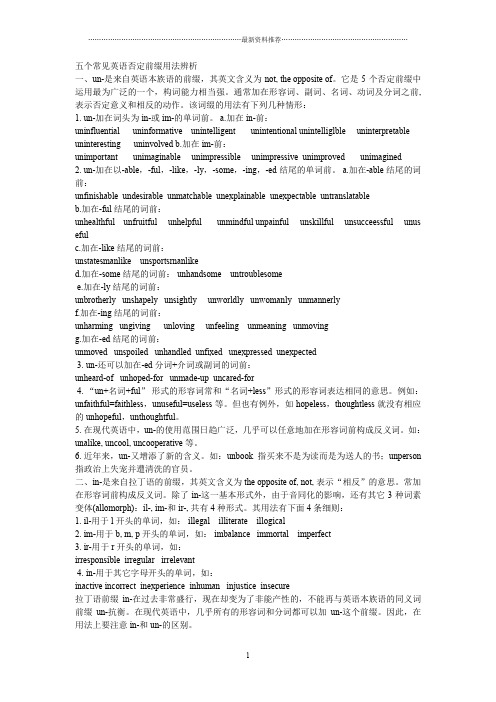
五个常见英语否定前缀用法辨析一、un-是来自英语本族语的前缀,其英文含义为not, the opposite of。
它是5个否定前缀中运用最为广泛的一个,构词能力相当强。
通常加在形容词、副词、名词、动词及分词之前,表示否定意义和相反的动作。
该词缀的用法有下列几种情形:1. un-加在词头为in-或im-的单词前。
a.加在in-前:uninfluential uninformative unintelligent unintentional unintelliglble uninterpretable uninteresting uninvolved b.加在im-前:unimportant unimaginable unimpressible unimpressive unimproved unimagined2. un-加在以-able,-ful,-like,-ly,-some,-ing,-ed结尾的单词前。
a.加在-able结尾的词前:unfinishable undesirable unmatchable unexplainable unexpectable untranslatableb.加在-ful结尾的词前:unhealthful unfruitful unhelpful unmindful unpainful unskillful unsucceessful unus efulc.加在-like结尾的词前:unstatesmanlike unsportsrnanliked.加在-some结尾的词前: unhandsome untroublesomee.加在-ly结尾的词前:unbrotherly unshapely unsightly unworldly unwomanly unmannerlyf.加在-ing结尾的词前:unharming ungiving unloving unfeeling unmeaning unmovingg.加在-ed结尾的词前:unmoved unspoiled unhandled unfixed unexpressed unexpected3. un-还可以加在-ed分词+介词或副词的词前:unheard-of unhoped-for unmade-up uncared-for4. “un+名词+ful”形式的形容词常和“名词+less”形式的形容词表达相同的意思。
英语否定的前缀词汇小结

英语否定的前缀词汇小结英语否定的前缀词汇小结英语否定的前缀主要有a- ab- anti- counter- de- dis- il- im- in- ir- mal- mis- non- un- 等。
a-ab-主要加在形容词动词前,例如atypical非典型性的,abnormal非正常的;abuse滥用、错误使用、虐待;anti-加在名词、形容词前边。
最常见的是anti-Japanese抗日战争、anti-social厌恶社会的反社会的、antidite解毒的药;counter-加在名词、动词前,例如:counterstrike反击、counteract抵抗阻碍、counterrevolution反革命。
de-加在名词、形容词前,常见的例词有decrease减少,deteriorate恶化,demobilize遣散使…复员、decolor 脱色漂白;dis-主要加在名词、形容词,动词之前,dis-为否定前缀的词有:disadvantage缺点、dishonorable不光彩的、disagree不同意、disappear消失、disarm解除武装、disconnect失去联系il-主要加在以1开头的单词的前边,比如:illegal非法的、illiterate文盲的、illogical不合逻辑的;im-加在字母m,b,p之前,这样的词有impossible不可能的、impolite不礼貌的in-常加在形容词,名词之前,如incorrect不正确的、inability无能无力、inaccurate不准确的等;ir-放在以r开头的英语单词前面,比如:irregular不稳定的'、irresistable不可抵抗的、irresolvable不能分解的不能解决的;mal-主要加在形容词名词之前,例如malfunction功能紊乱,malicious恶意的;mis-加在动词、名词前,例词misunderstand误解、misjudge 误判、misleading误导、misfortune不幸;non-加在形容词、名词前,这样以non-为否定前缀的词有non-existence不存在、non-essential不主要的、non-electrical非电的;un-主要放于名词,形容词,副词前面,常见的例子有unfinished未完成的、undoubted无疑的、unemployment失业。
表示否定的前缀

表示否定的前缀1.dis-加在名词、形容词,动词之前。
disadvantage(缺点)dishonorable(不光彩的)disagree(不同意)2.in-加在形容词,名词之前incorrect(不正确的),inability(无能,无力),inaccurate(不准确的)3.im-加在字母m,b,p之前impossible(不顺能的),impolite(不礼貌的),impudence(厚颜无耻)4.il-加在以1开头的词前illegal(非法的),illiterate(文盲的,无文化的)illogical(不合逻辑的)5.ir-加在以r开头的词前irregular(不稳定的),irresistable(不可抵抗的),irresolvable(不能分解的,不能解决的)6.un-加在名词,形容词,副词之前unfinished(未完成的)undoubted(无疑的)unemployment(失业)7.non-加在形容词,名词前non-existence(不存在),non-essential(不主要的),non-electrical(非电的)8.mis-加在动词、名词之前misunderstand(误解),misjudge(误判),misleading(误导),misfortune(不幸)9.dis-加地动词之前disappear(消失),disarm(解除武装),disconnect(失去联系)10.de-加在名词,形容词之前demobilize(遣散;使…复员) decolor (脱色, 漂白)11.anti-加在名词、形容词之前anti-Japanese(抗日战争),anti-social(厌恶社会的,反社会的),antidite(解毒药)12.counter-加在名词、动词前counterattack(反攻,反击),counteract(抵抗,阻碍)counterrevolution(反革命)廉政公署(简称廉署;英语:Independent Commission Against Corruption,ICAC)是香港一个专门打击贪污的独立执法机构。
英文否定前缀
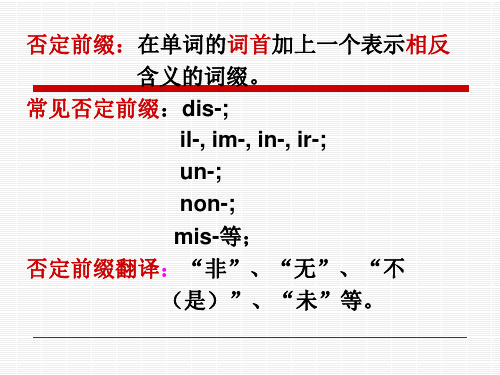
那个受伤的人不能走路,所以他得被人背着。
24.He was _u_n_a_b_l_e__ (ability) to sleep at night
because of his anxiety.由于焦虑,晚上他不能入睡。
25.The fish is a bit _s_m__e_ll_y__ (smell). We can't eat
ambassador had been arrested for spying.
政府公开另一个外交大使园间谍罪被逮捕。
6.His identity is u_n__k_n_o_w__n(know) to us so we
have to confirm.他的身份为我们所不知,所以我们 得证实。
7.He seems to be u__n_a_w__a_r_e (aware)of the trouble
un-未(主要用于过去分词之前)
unexpected 未预料到) unlocked 未上锁的 uneducated 未受教育的 undecided 未决定的 unfinished 未完成的 uncrowded 不拥挤的 undoubted 无疑的 unmarried 未结婚的
4.non-加在名、形、副或作形容词的分词前, 表“无,抗,防,非,没”之意
nonsense(n.胡说、废话) non-violent(adj.非暴力的 ) nonpoisonous无毒的 nonexistent不存在的 nonsmoking 不准吸烟的 nonstop a.直达的
5.ab-,ab-加在词根前,表示"相反,离去” 如:
abnormal(ab+normal 正常的)反常的 abuse滥用、错误使用、虐待
英语否定的前缀词汇小结

英语否定的前缀词汇小结英语否定的前缀主要有a- ab- anti- counter- de- dis- il- im- in- ir- mal- mis- non- un- 等。
a-ab-主要加在形容词动词前,例如atypical非典型性的,abnormal非正常的;abuse滥用、错误使用、虐待;anti-加在名词、形容词前边。
最常见的是anti-Japanese抗日战争、anti-social厌恶社会的反社会的、antidite解毒的药;counter-加在名词、动词前,例如:counterstrike反击、counteract抵抗阻碍、counterrevolution反革命。
de-加在名词、形容词前,常见的例词有decrease减少,deteriorate恶化,demobilize遣散使…复员、decolor 脱色漂白;dis-主要加在名词、形容词,动词之前,dis-为否定前缀的词有:disadvantage缺点、dishonorable不光彩的、disagree不同意、disappear消失、disarm解除武装、disconnect失去联系il-主要加在以1开头的单词的前边,比如:illegal非法的、illiterate文盲的、illogical不合逻辑的;im-加在字母m,b,p之前,这样的词有impossible不可能的、impolite不礼貌的in-常加在形容词,名词之前,如incorrect不正确的、inability无能无力、inaccurate不准确的等;ir-放在以r开头的英语单词前面,比如:irregular不稳定的、irresistable不可抵抗的'、irresolvable不能分解的不能解决的;mal-主要加在形容词名词之前,例如malfunction功能紊乱,malicious恶意的;mis-加在动词、名词前,例词misunderstand误解、misjudge 误判、misleading误导、misfortune不幸;non-加在形容词、名词前,这样以non-为否定前缀的词有non-existence不存在、non-essential不主要的、non-electrical非电的;un-主要放于名词,形容词,副词前面,常见的例子有unfinished未完成的、undoubted无疑的、unemployment失业。
(完整)五个常见英语否定前缀用法辨析
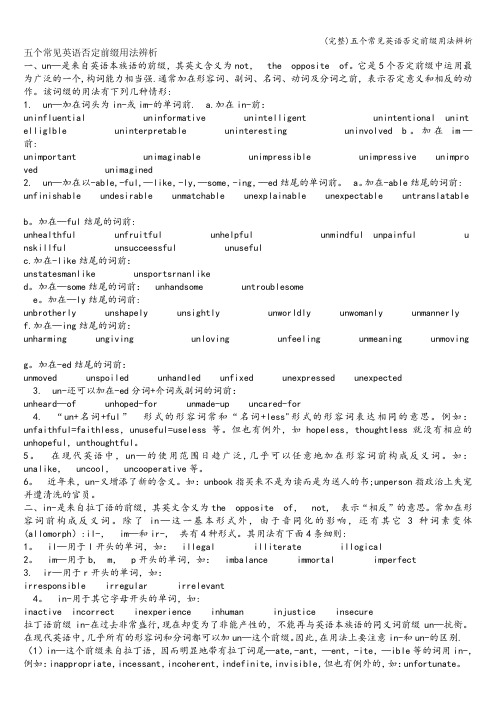
五个常见英语否定前缀用法辨析一、un—是来自英语本族语的前缀,其英文含义为not,the opposite of。
它是5个否定前缀中运用最为广泛的一个,构词能力相当强.通常加在形容词、副词、名词、动词及分词之前,表示否定意义和相反的动作。
该词缀的用法有下列几种情形:1. un—加在词头为in-或im-的单词前. a.加在in-前:uninfluential uninformative unintelligent unintentional unint elliglble uninterpretable uninteresting uninvolved b。
加在im—前:unimportant unimaginable unimpressible unimpressive unimpro ved unimagined2. un—加在以-able,-ful,—like,-ly,—some,-ing,—ed结尾的单词前。
a。
加在-able结尾的词前: unfinishable undesirable unmatchable unexplainable unexpectable untranslatableb。
加在—ful结尾的词前:unhealthful unfruitful unhelpful unmindful unpainful u nskillful unsucceessful unusefulc.加在-like结尾的词前:unstatesmanlike unsportsrnanliked。
加在—some结尾的词前:unhandsome untroublesomee。
加在—ly结尾的词前:unbrotherly unshapely unsightly unworldly unwomanly unmannerly f.加在—ing结尾的词前:unharming ungiving unloving unfeeling unmeaning unmovingg。
- 1、下载文档前请自行甄别文档内容的完整性,平台不提供额外的编辑、内容补充、找答案等附加服务。
- 2、"仅部分预览"的文档,不可在线预览部分如存在完整性等问题,可反馈申请退款(可完整预览的文档不适用该条件!)。
- 3、如文档侵犯您的权益,请联系客服反馈,我们会尽快为您处理(人工客服工作时间:9:00-18:30)。
五个常见英语否定前缀用法辨析
一、un-是来自英语本族语的前缀,其英文含义为not, the opposite of。
它是5个否定前缀中运用最为广泛的一个,构词能力相当强。
通常加在形容词、副词、名词、动词及分词之前,表示否定意义和相反的动作。
该词缀的用法有下列几种情形:
1. un-加在词头为in-或im-的单词前。
a.加在in-前:
uninfluential uninformative unintelligent unintentional unintelliglble uninterpretable uninteresting uninvolved b.加在im-前:
unimportant unimaginable unimpressible unimpressive unimproved unimagined
2. un-加在以-able,-ful,-like,-ly,-some,-ing,-ed结尾的单词前。
a.加在-able结尾的词前:
unfinishable undesirable unmatchable unexplainable unexpectable untranslatable
b.加在-ful结尾的词前:
unhealthful unfruitful unhelpful unmindful unpainful unskillful unsucceessful unus eful
c.加在-like结尾的词前:
unstatesmanlike unsportsrnanlike
d.加在-some结尾的词前: unhandsome untroublesome
e.加在-ly结尾的词前:
unbrotherly unshapely unsightly unworldly unwomanly unmannerly
f.加在-ing结尾的词前:
unharming ungiving unloving unfeeling unmeaning unmoving
g.加在-ed结尾的词前:
unmoved unspoiled unhandled unfixed unexpressed unexpected
3. un-还可以加在-ed分词+介词或副词的词前:
unheard-of unhoped-for unmade-up uncared-for
4. “un+名词+ful”形式的形容词常和“名词+less”形式的形容词表达相同的意思。
例如:unfaithful=faithless,unuseful=useless等。
但也有例外,如hopeless,thoughtless就没有相应的unhopeful,unthoughtful。
5. 在现代英语中,un-的使用范围日趋广泛,几乎可以任意地加在形容词前构成反义词。
如:unalike, uncool, uncooperative等。
6. 近年来,un-又增添了新的含义。
如:unbook指买来不是为读而是为送人的书;unperson 指政治上失宠并遭清洗的官员。
二、in-是来自拉丁语的前缀,其英文含义为the opposite of, not, 表示“相反”的意思。
常加在形容词前构成反义词。
除了in-这一基本形式外,由于音同化的影响,还有其它3种词素变体(allomorph):il-, im-和ir-, 共有4种形式。
其用法有下面4条细则:
1. il-用于l开头的单词,如: illegal illiterate illogical
2. im-用于b, m, p开头的单词,如: imbalance immortal imperfect
3. ir-用于r开头的单词,如:
irresponsible irregular irrelevant
4. in-用于其它字母开头的单词,如:
inactive incorrect inexperience inhuman injustice insecure
拉丁语前缀in-在过去非常盛行,现在却变为了非能产性的,不能再与英语本族语的同义词前缀un-抗衡。
在现代英语中,几乎所有的形容词和分词都可以加un-这个前缀。
因此,在用法上要注意in-和un-的区别。
(1)in-这个前缀来自拉丁语,因而明显地带有拉丁词尾-ate,-ant,-ent,-ite,-ible等的词用in-,例如:inappropriate,incessant,incoherent,indefinite,invisible,但也有例外的,如:unfortunate。
(2)以im-或in-为词头的单词不能再用in-,只能用un-,例如:unimaginable,unimpressive,uninfluential,unintelligent。
(3)以-able,-ed,-ful,-ing,-like,-ly,-some结尾的词多用un-,例如:unfashionable,unhatched,unsuccessful,unharming,unstatesmanlike,unworthily,untroublesome。
(4)凡是已固定加了拉丁前缀in-的形容词,通常不能改用un-,例如:inactive,inaudible,infillable。
四、dis-是来自拉丁语的前缀,其英文含义为not, the opposite of,一般加在抽象名词、形容词及动词前构成“否定”、“相反”、“除去”等意思。
1. dis-加在名词前:
disharmony dishonesty disbelief
2. dis-加在形容词前:
disrespectful distrustful disloyal dislikable
3. dis-加在动词前:
disapprove disbelieve disimprove disobey
而mis-加在动词、名词前,例词misunderstand误解、misjudge误判、misleading误导、misfortune 不幸;
初中英语形容词否定前后缀语法归纳
☆特别提醒:
◇初中阶段,形容词否定前缀大多以un-构成,除去少数几个以-less否定后缀结尾外,不是以un-否定前缀构成的形容词基本上只有7个。
即上表中以dis-, im-, in-, ir-开头的七个例词。
换言之,如果把这七个词烂熟于心,那么记忆形容词否定前缀就将事半功倍。
◇以un-开头的形容词其前面的冠词用的是an。
例如:an unusual boy。
◇dis-否定前缀除了形容词dishonest外,还常常用在动词前构成否定形式,如dislike, disagree,。
